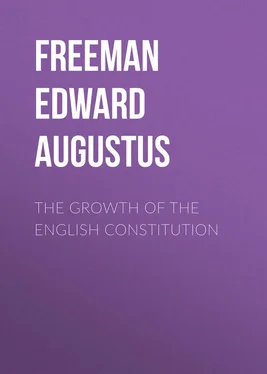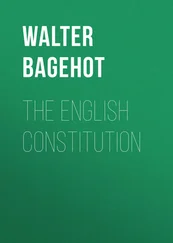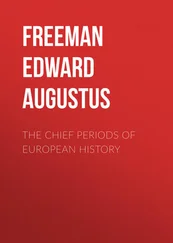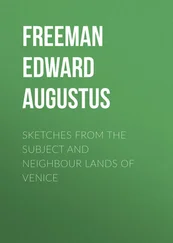Edward Freeman - The Growth of the English Constitution
Здесь есть возможность читать онлайн «Edward Freeman - The Growth of the English Constitution» — ознакомительный отрывок электронной книги совершенно бесплатно, а после прочтения отрывка купить полную версию. В некоторых случаях можно слушать аудио, скачать через торрент в формате fb2 и присутствует краткое содержание. Жанр: foreign_antique, foreign_prose, на английском языке. Описание произведения, (предисловие) а так же отзывы посетителей доступны на портале библиотеки ЛибКат.
- Название:The Growth of the English Constitution
- Автор:
- Жанр:
- Год:неизвестен
- ISBN:нет данных
- Рейтинг книги:5 / 5. Голосов: 1
-
Избранное:Добавить в избранное
- Отзывы:
-
Ваша оценка:
- 100
- 1
- 2
- 3
- 4
- 5
The Growth of the English Constitution: краткое содержание, описание и аннотация
Предлагаем к чтению аннотацию, описание, краткое содержание или предисловие (зависит от того, что написал сам автор книги «The Growth of the English Constitution»). Если вы не нашли необходимую информацию о книге — напишите в комментариях, мы постараемся отыскать её.
The Growth of the English Constitution — читать онлайн ознакомительный отрывок
Ниже представлен текст книги, разбитый по страницам. Система сохранения места последней прочитанной страницы, позволяет с удобством читать онлайн бесплатно книгу «The Growth of the English Constitution», без необходимости каждый раз заново искать на чём Вы остановились. Поставьте закладку, и сможете в любой момент перейти на страницу, на которой закончили чтение.
Интервал:
Закладка:
But, besides that growth of the King’s power which followed naturally on the growth of the King’s dominions, another cause was busily at work which clothed him with a personal influence which was of almost greater moment than his political authority. To a large portion of his subjects, to all the men of special wealth or power, the King gradually became, not only King but lord ; his subjects gradually became, not only his subjects but his men . These names may need some explanation, and I will again go back to Tacitus as our starting-point. Side by side with the political community, the King, the nobles, the popular Assembly, all of them strictly political powers, he describes another institution, a relation in itself not political but purely personal, but which gradually became of the highest political moment. This was the institution of the comitatus , the system of personal relation between a man and his lord, a relation of faithful service on one side, of faithful protection on the other. Let us again hear the words of the great Roman interpreter of our own earliest days 51.
“It is no shame among the Germans to be seen among the companions ( comites ) of a chief. And there are degrees of rank in the companionship ( comitatus ), according to the favour of him whom they follow; and great is the rivalry among the companions which shall stand highest in the favour of his chief, and also among the chiefs which shall have the most and the most valiant companions… When they come to battle, it is shameful for the chief to be surpassed in valour; it is shameful for his companions not to equal the valour of their chief. It is even a badge of disgrace for the remainder of life if a man comes away alive from the field on which his chief has fallen. To guard, to defend him, to assign their own valiant deeds to his credit, is their first religious duty. The chiefs fight for victory; the companions fight for their chief.”
This is the description given by a Roman historian of the second century; let me set beside it the words of an English poet of the tenth. He is describing the battle of Maldon in 991, which was fought by the East-Saxons under their Ealdorman Brihtnoth against the invading Northmen. The Ealdorman has been killed; two of his followers have fled, one of them on the Ealdorman’s horse, and every word that is put into the mouth of his faithful companions turns upon the personal tie between them and their lord 52.
“Thereon hewed him
The heathen soldiers;
And both the warriors
That near him by-stood,
Ælfnoth and Wulfmær both,
Lay there on the ground
By their lord;
Their lives they sold.
There bowed they from the fight
That there to be would not;
There were Odda’s bairns
Erst in flight;
Godric from battle went,
And the good man forsook
That to him ofttimesHorses had given.
He leapt on the horse
That his lord had owned,
On the housings
That it not right was.”
Presently we read of the deeds done by his Thegns over his body;
“There was fallen
The folk’s Elder,
Æthelred’s Earl;
All there saw
Of his hearth’s comrades
That their lord lay dead.
Then there went forth
The proud Thanes,
The undaunted men
Hastened gladly;
They would there all
One of two things,
Either life forsake,
Or the loved one wreak.”
Then one of the Thegns speaks;
“Neither on that folk
Shall the Thanes twit me
That I from this host
Away would go
To seek my home,
Now mine Elder lieth
Hewn down in battle;
To me is that harm most;
He was both my kinsman
And my lord.”
Then another speaks in answer;
“How thou, Ælfwine, hast
All our Thanes
In need-time cheered.
Now our lord lieth,
The Earl on the earth,
That of us each one
Others should embolden,
Warmen to the war,
That while we weapons may
Have and hold,
The hard falchion,
Spear and good sword.”
Then another speaks;
“I this promise
That I hence nill
Flee a footstep,
But will further go,
To wreak in the fight
My lord and comrade.
Nor by Stourmere
Any steadfast hero
With words need twit me
That I lordless
Homeward should go,
And wend from the fight.
The story goes on a little later;
“Rath was in battle
Offa hewn down,
Yet had he furthered
That his lord had pledged,
As he ere agreed
With his ring-giver
That they should both
To the borough ride
Hale to home,
Or in the host cringe
On the slaughter place,
Of their wounds die.
He lay thane-like
His lord hard by.”
Lastly another Thegn speaks;
“Mind shall the harder be,
Heart shall the keener be,
Mood shall the more be,
As our main lessens.
Here lies our Elder,
All down hewn,
A good man in the dust;
Ever may he groan
Who now from this war-play
Of wending thinketh.
I am old of life;
Hence stir will I not,
And I by the half
Of my lord,
By such a loved man
To lie am thinking.”
This institution of military companionship seems to have struck Tacitus with some amazement. He says that this kind of personal relation was among the Germans not thought shameful. This was the natural feeling of a Roman. The duty of a Roman citizen was wholly towards the state. The state might be represented either by a responsible magistrate or by an irresponsible Emperor; in either case obedience was due to the representative of the state; but there was no personal relation to the man. The old Roman institution of patron and client, which was so like the German comitatus , had pretty well died out by the time of Tacitus, and it had at no time been entered into by men of high rank 53. What amazed Tacitus was that among the Germans the noblest in birth and exploits were not looked on as dishonoured by entering the service of a personal lord. To Tacitus himself Trajan was the chief magistrate of the Roman commonwealth, the chief commander of the Roman army; he was a personal master to none but his slaves and freedmen 54. It was only in a much later stage of the Roman Empire that personal service in the court and household of the Emperor began to be looked on as honourable 55. But among the Teutonic nations the personal relation coloured everything; personal service towards a King or other chief was honourable from the beginning; the proudest nobles of Europe have down to this day thought themselves honoured by filling offices about the persons of Emperors, Kings, and other princes which Tacitus would have deemed beneath the dignity of any Roman citizen. We are now accustomed to see this kind of service paid in the case of royal personages only; a few centuries back men of any rank deemed themselves honoured by paying the like service to men of the rank next above their own, or even to men of their own rank who had the start of them in age and reputation. The knight was served by his esquire and the master by his scholar; and the same principle, laid aside everywhere else, lingers on in what is undoubtedly a trace of the Teutonic comitatus , the fagging of our public schools. Now the political effect of the existence of the principle of personal service, the institution of the comitatus , alongside of the primitive political community, was most important in our early history. The personal relation went far to swallow up the purely political one. To enter the service of a chief became so established a practice that at last it was deemed that it was the part of every man to “seek a lord,” as the phrase was, to commend himself, to put himself under the protection of some man more powerful than himself 56. The man owed faithful service to his lord ; the lord owed faithful protection to his man. The very word Lord , in its older and fuller form Hlaford , implies the rewards which the lord bestowed on his faithful man. The word is in some sort a puzzling one; but there can be no doubt that it is connected with hlaf , loaf , and that its general meaning is the giver of bread 57. Now herein lurks something which has greatly affected all later political and social arrangements. The institution of the comitatus in its first state had nothing whatever to do with the holding of land. But the man looked for reward of his faithful service at the hands of his lord ; he looked for the bread of which his lord’s title proclaimed him as the giver. There was of course no form of reward, no form of bread , so convenient or so honourable as that of a grant of land to be held as the reward of past and the condition of future service. Moreover the custom of granting out lands to be held by the tenure of military service had become common in the later days of Roman power 58. Such lands were of course held, not of the Emperor as a personal lord, but of the Roman Commonwealth of which he was the head and representative. But the custom of holding lands by military service fell in well with the Teutonic institution of personal service, and the union of the two in the same person produced that feudal relation which has had such an important bearing on all political and social life through the whole of the middle ages and down to our own time. The land granted by the lord to his man, or the land which the man agreed to hold as if it had been so granted, might be a kingdom held of the Emperor or the Pope, or it might be the smallest estate held of a more powerful neighbour. In either case, such a holding by military service was a fief , and from the institution of such fiefs the so-called Feudal System, with all its manifold workings for good and for evil, had its rise. But so far as the Feudal System existed, either in England or in any other country, it existed wholly as a system which had grown up by the side of an earlier system which it wholly or partially displaced. The feudal tenant, holding his land of a lord by military service gradually supplanted, wholly or partially, in most countries of Europe, the allodial holder who held his land of no other man, and who knew no superior but God and the Law 59. In England this change took place only gradually and partially; it was through the Norman Conquest, or, more accurately, through the subtle legal theories which came in with the Norman Conquest, that it was finally established. And, after all, it was rather in theory than in fact that it was established. The Feudal System, as something spreading into every corner of the land, and affecting every relation of life, never obtained the same complete establishment in England which it did in some continental countries.
Читать дальшеИнтервал:
Закладка:
Похожие книги на «The Growth of the English Constitution»
Представляем Вашему вниманию похожие книги на «The Growth of the English Constitution» списком для выбора. Мы отобрали схожую по названию и смыслу литературу в надежде предоставить читателям больше вариантов отыскать новые, интересные, ещё непрочитанные произведения.
Обсуждение, отзывы о книге «The Growth of the English Constitution» и просто собственные мнения читателей. Оставьте ваши комментарии, напишите, что Вы думаете о произведении, его смысле или главных героях. Укажите что конкретно понравилось, а что нет, и почему Вы так считаете.












